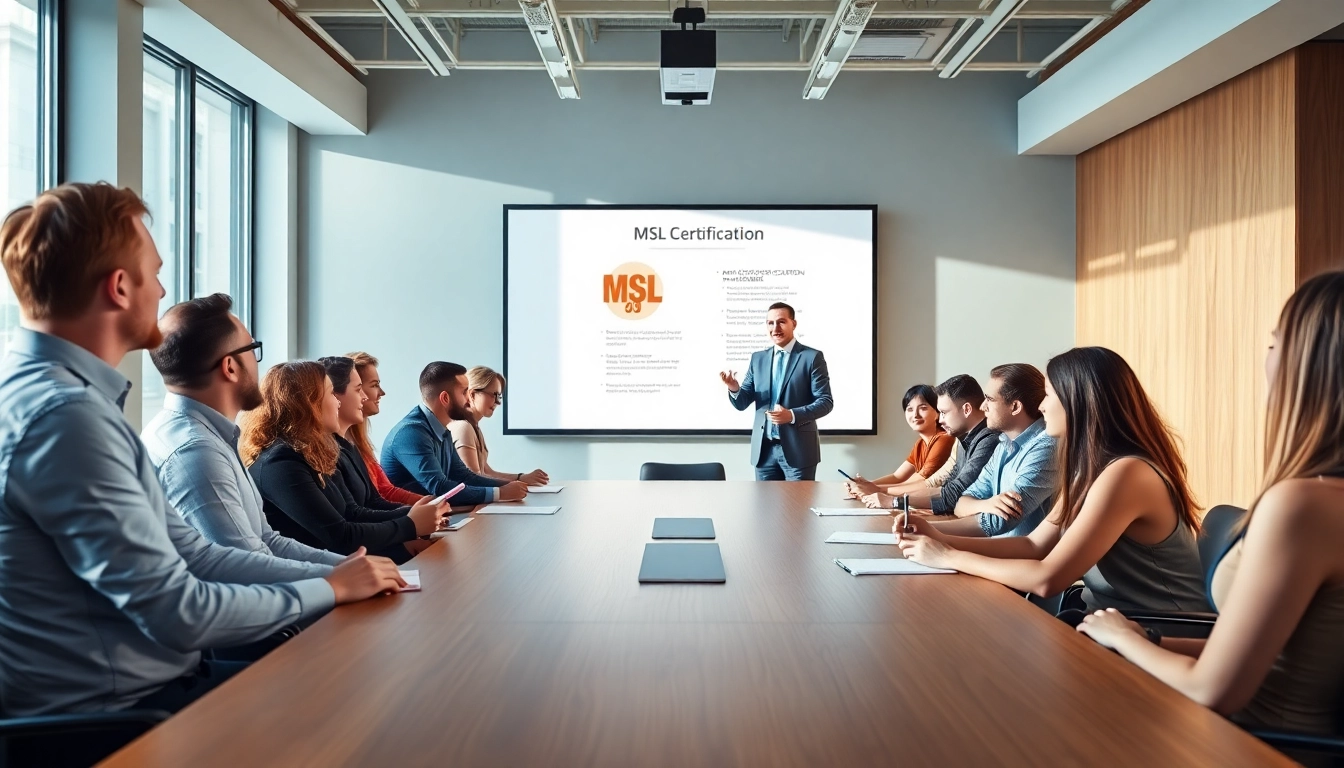Understanding msl Certification
What is msl Certification?
The Medical Science Liaison (MSL) certification is a professional credential that validates the expertise and competencies of individuals working as medical science liaisons. An MSL is a crucial part of the pharmaceutical industry, serving as a bridge between pharmaceutical companies and healthcare professionals. They are tasked with providing scientific and clinical information on products and therapeutic areas to healthcare practitioners, thereby aiding in informed treatment decisions. The msl certification signifies that a professional has achieved a certain level of knowledge and practical skills in this specialized field, allowing them to effectively communicate complex scientific data and translate it into actionable insights for doctors and other healthcare stakeholders.
Benefits of msl Certification for Professionals
Obtaining an msl certification comes with a wealth of benefits for individuals aspiring to thrive in the pharmaceutical and life sciences industries. Firstly, it enhances career prospects significantly; certified MSLs often find better job opportunities, higher salaries, and greater job stability compared to their non-certified counterparts. Secondly, the certification boosts credibility among peers and healthcare professionals, as it demonstrates a commitment to continuous learning and professional development. Additionally, certified MSLs are typically more adept at navigating complex regulatory environments and understanding clinical and commercial landscapes, which positions them as invaluable assets to their organizations.
Key Requirements for Obtaining msl Certification
To qualify for MSL certification, candidates must meet certain prerequisites. Most certification bodies require a minimum of a Master’s degree in a related field such as life sciences, pharmacy, or medicine. Candidates often need at least two years of experience in a healthcare-related role, particularly within the pharmaceutical or biotech industries. Moreover, prospective MSLs are expected to possess not only scientific knowledge but also strong communication and interpersonal skills, as the role requires interaction with a wide range of healthcare professionals. Other requirements may include passing a comprehensive exam that tests both theoretical understanding and practical application of concepts relevant to the MSL role.
The msl Certification Process
Step-by-Step Guide to msl Certification
The certification process for MSLs typically involves several systematic steps. Firstly, interested candidates must thoroughly research certified programs to identify one that aligns with their career goals and academic background. After selecting a program, candidates are required to complete the necessary application process, which may include submitting academic transcripts and providing proof of work experience. Following acceptance, candidates must engage in preparatory study, which may consist of coursework, workshops, and clinical practice simulations. The final step is to pass the certification examination, which often requires extensive review to ensure a comprehensive understanding of relevant concepts.
Preparing for the msl Certification Exam
Preparation for the MSL certification exam is critical and demands a strategic approach. Utilizing study materials such as textbooks, online courses, and review guides tailored to the MSL and broader pharmaceutical industries can enhance understanding. Many candidates also benefit from forming study groups, which can provide support and different perspectives on challenging subjects. Practical experience, through shadowing seasoned MSLs or participating in internships, can significantly bolster one’s readiness. Additionally, mock exams and practice questions should be utilized to familiarize oneself with the exam format and identify areas that require further study.
Common Challenges in the Certification Process
While the path to MSL certification is rewarding, it is not without its challenges. One of the primary hurdles candidates face is time management. Balancing work obligations, studying, and personal commitments can be daunting. Candidates may also struggle with the breadth and depth of the material to be studied, as the exam often covers a wide range of topics in both medical knowledge and regulatory affairs. To overcome these challenges, creating a structured study schedule can help allocate time effectively and alleviate stress. Additionally, seeking guidance from mentors or tutors can provide clarity on complicated topics and boost confidence heading into the exam.
Best Practices for Success in msl Certification
Study Strategies for Effective Learning
Implementing effective study strategies is crucial for mastering the content required for MSL certification. Active learning techniques—such as summarizing information in one’s own words, teaching concepts to peers, and applying the knowledge to real-world applications—can improve retention significantly. Additionally, incorporating various study formats, such as videos, podcasts, and interactive modules, can accommodate different learning styles and keep engagement high. Regularly scheduled reviews of previously covered materials will also reinforce knowledge and enhance long-term memory retention.
Utilizing Resources and Networking Opportunities
Leveraging available resources is fundamental to achieving MSL certification success. Many organizations offer workshops, webinars, and resources specifically designed for MSLs. Joining professional organizations or associations can provide networking opportunities that can lead to mentorship, potential job openings, and insider information on industry trends. Engaging with fellow candidates or certified MSLs through forums or social media platforms can also offer invaluable insights into best practices and study tips.
Real-Life Examples of msl Certification Success Stories
Real-life success stories of certified MSLs can serve as powerful motivation for candidates. For instance, many certified MSLs report significant advancements in their careers, often transitioning from entry-level positions to senior roles following certification. One notable example is a professional who, after obtaining their MSL certification, was able to secure a position with a leading pharmaceutical firm, resulting in an increase in salary and responsibilities. These personal testimonies frequently highlight not only the benefits of certification but also the importance of continuous learning and professional development beyond initial certification.
Post-Certification: Maximizing Your msl Certification
Leveraging Your Certification in the Job Market
Once certified, leveraging the MSL certification in the job market is essential for career growth. Professionals should update their resumes and LinkedIn profiles to reflect their newly obtained certification, ensuring they highlight the skills and knowledge gained through the process. During interviews, it’s beneficial to discuss how the certification has equipped them with the resources to address specific challenges in the industry, such as interpreting clinical data or navigating regulatory environments. Networking at industry events and conferences can also facilitate connections with hiring managers who value certified MSLs.
Continuing Education and Further Certifications
Continuous professional development is crucial for MSLs, as the pharmaceutical landscape is constantly evolving. Many certified MSLs choose to pursue further certifications or specialized training in areas such as advanced clinical practice, healthcare regulations, or communications strategies. Engaging in continuing education helps maintain expertise and demonstrates a commitment to professional advancement. Additionally, many organizations offer recertification options that require ongoing education credits, thereby encouraging MSLs to stay updated on industry trends and developments.
Networking and Professional Development Opportunities
Networking remains an essential component of a successful MSL career. Beyond job search benefits, cultivating professional relationships can foster collaborative opportunities and ongoing mentorship. Attending conferences, webinars, and workshops, as well as joining professional organizations, can create avenues for knowledge sharing and community building. Online platforms such as LinkedIn groups and dedicated forums can offer continuous engagement with other MSLs, where sharing insights and discussing emerging topics are commonplace.
Measuring the Impact of msl Certification on Your Career
Performance Metrics and Career Advancement
Quantifying the impact of MSL certification on career advancement can be achieved through various performance metrics. These may include tracking changes in job titles, salary increments, and promotional opportunities within a certain time frame after obtaining the certification. Additionally, measuring the success of MSLs can involve evaluating how their communication and scientific presentation skills have improved, reflected in feedback from healthcare professionals and peers. Organizations may also keep metrics on how certified MSLs contribute to successful product launches and improved patient outcomes.
Feedback from Certified Professionals
Feedback from individuals who have successfully obtained MSL certification can provide valuable insights into the process and its impact. Many professionals emphasize the enhancement in their confidence levels when communicating with healthcare professionals and addressing clinical inquiries. Others highlight the network of certified peers they gained, which has proven beneficial for knowledge sharing and collaboration. This community aspect fosters a sense of belonging within the profession, empowering individuals to excel and remain committed to ongoing learning.
Long-Term Benefits of msl Certification
The long-term benefits of obtaining MSL certification extend far beyond initial career advancements. Many certified MSLs report an increased capacity for adaptability in a rapidly changing industry, better alignment with organizational goals, and a heightened sense of professional fulfillment. Moreover, as companies increasingly recognize the value of certified professionals, MSLs with certification may find greater job security and opportunities for leadership roles, enhancing their marketability. Ultimately, the certification serves not only as a testament to one’s skills and knowledge but also as a catalyst for ongoing success in the healthcare and pharmaceutical realm.



